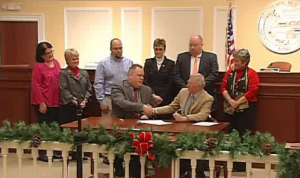Hay Declares ‘Fiscal Emergency’ at Organizational Meeting
A bleak outlook caused by the town’s revenue shortfall and negative fund balance only scratched the surface of Southeast’s problems during the town board’s organizational meeting this past Thursday, as residents eagerly awaited new Town Supervisor Tony Hay’s State of the Town address.

Hay, a Republican who defeated incumbent Michael Rights during the September primary and later went on to win an uncontested general election in November, said he didn’t intend to continually slam the former supervisor, but warned the night’s attendees and those watching at home that there was much to be done to turn the town around.
“The Town of Southeast was a ship adrift at sea without a captain—now that I’m the captain I notice the name of the ship is the Titanic, and it just hit an iceberg,” Hay said. “The Town of Southeast has a problem, the town has a very serious problem.”
Comparing the town’s current situation to those of the past, Hay said the incoming supervisor in 2004 had a surplus in funds of $2 million, while Rights inherited nearly $1.7 million in 2008. Though he said his accountant calculated $94,000 in surplus funds for 2012, Hay said Southeast is “heading into the year with minus $250,000.”
“Last year alone, town revenues declined drastically as a result of a shortfall in tax penalties, tax collector fees, assessment fees, recreation fees, mortgage tax fees, fines and forfeitures,” Hay said. “Then there were the following departments: the justice courts, supervisor, town clerk, town attorney, town engineer, facilities and maintenance which exceeded their budgets.”
Despite his status as a fiscal conservative, Hay openly admitted there are “musts” when it comes to spending, like attorney fees and repairs and maintenance from increasingly powerful and unpredictable storms. Rather than focus on the misuse of the past, Hay offered solutions to help the town get back on track economically. Prior to his declaration of the town’s “fiscal emergency,” Hay and Brewster Mayor Jim Schoenig agreed to consolidate and cooperate three major services—a move the former county legislator of 20 years claimed as “somewhat historic.”
“I’ve been a Southeast resident since 1957 and for the past 20 years we’ve heard about cooperation, shared services and everything to do with the Village of Brewster—and year, after year, after year, nothing happens,” Hay said. “This town and village are going to find ways to cooperate and share services.”
The first three moves that helped start this relationship during Thursday’s organizational meeting was the establishment of shared services regarding a uniformed court officer, the enforcement of the Gold Lot alongside the Old Town Hall at 67 Main St., and the building inspector/code enforcement officer. Brewster’s Board of Trustees joined board members for a symbolic signing agreement that initiated the beginning of consolidation and coordination efforts.
Hay also called for a one-year open space moratorium. The board will establish a public comment period while the town considers whether or not to halt land purchases for a minimum of one year. Councilwoman Lynne Eckardt recommended the Open Space Committee promote the use of the town’s public spaces during Putnam County’s bicentennial celebration.
“Even though voters approved spending of up to $5 million in 2008, both the economy and the town’s financial picture have changed dramatically—to date, the single open space purchase of $1.9 million, which is up on Pugsley Road adjacent to Tilly Foster Farm, will cost the town $163,000 in principal and interest,” Hay said.
Reflective of a county policy, spending amongst town employees must be no more than the amount of $100, unless preapproved by the supervisor himself. Those who present a purchase invoice greater than $100 without preapproval will be responsible for the payment of that item.
“I don’t want to play hardball, but you know what, we’ve got a problem,” Hay said. “I’m not trying to be a dictator, don’t get me wrong, but I need to know where every penny in this town goes because we have a long road ahead, and if I know what’s going on, I can help make it better.”
In an effort to include the community in reshaping the dynamic of Southeast, Hay suggested the formation of various committees to increase input from residents.
“The issues we face on the local level affect us equally—it doesn’t discriminate by political party, sex, religion or race,” Hay said. “As Supervisor, I will be creating numerous supervisory advisory committees to get as many people in the town as humanly possible involved in our government.”

Adam has worked in the local news industry for the past two decades in Westchester County and the broader Hudson Valley. Read more from Adam’s author bio here.
